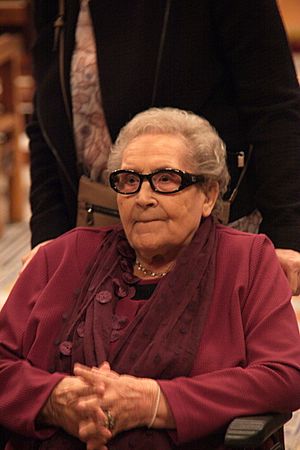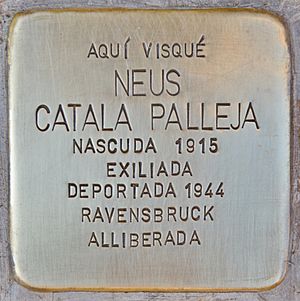Neus Català facts for kids
Quick facts for kids
Neus Català
|
|
|---|---|

Català in October 2015
|
|
| Born |
Neus Català i Pallejà
6 October 1915 Els Guiamets, Catalonia, Spain
|
| Died | 13 April 2019 (aged 103) Els Guiamets, Catalonia, Spain
|
| Occupation |
|
| Known for | Catalan survivor of Ravensbrück concentration camp |
Neus Català i Pallejà (born October 6, 1915 – died April 13, 2019) was a brave woman from Catalonia, Spain. She was a member of a political party called the Unified Socialist Party of Catalonia during the Spanish Civil War. Neus is especially remembered because she survived a terrible place called the Ravensbrück concentration camp, which was a prison camp run by the Nazis during World War II. She was one of many people from Catalonia who survived being held in these Nazi camps.
Her Life Story
Neus Català was born on October 6, 1915, in a town called Els Guiamets in Catalonia. When the Spanish Civil War began, she moved to Barcelona and became a nurse.
In 1939, Neus had to leave Spain to escape the forces of General Franco. She bravely took 182 orphaned children with her across the French border. These children were from a place called Las Acacias. Neus later helped them return home or find new families.
While living in France, Neus and her husband, Albert Roger, joined the French Resistance. This was a secret group that fought against the Nazis who had taken over France. Neus helped by hiding messages, documents, weapons, and people who needed a safe place.
Sadly, a pharmacist told the Nazi authorities about her. Neus and her husband were arrested by the Nazis on November 11, 1943. Neus was put in prison and tortured in a city called Limoges. In 1944, she was sent to the Ravensbrück concentration camp. Here, she was forced to work in factories making weapons.
But Neus didn't give up! She joined a secret group of women called the "Lazy Commandos." These women bravely sabotaged, or secretly damaged, the weapons they were forced to make. Thanks to their efforts, the factory produced millions of faulty bullets and broke many weapon-making machines. This helped the Allies fighting against the Nazis.
After she was freed from the camp, Neus returned to France. She later married another Spanish exile named Félix Sancho.
Neus continued her secret fight against the government in Spain even after the war. She lived near Paris and led an association for people who had survived the Ravensbrück concentration camp. In 1978, she moved back to Rubí, Catalonia.
She remained active in political groups throughout her life. Neus Català passed away on April 13, 2019, at the age of 103.
Awards and Honors

Neus Català received many important awards for her bravery and dedication:
- In 2005, the government of Catalonia gave her the Cross of St. George.
- In 2006, she was chosen as the "Catalan Person of the Year." This was to honor her work in remembering the more than 92,000 women who died in Ravensbrück concentration camp.
- On October 29, 2014, the city of Barcelona gave her the Gold Medal of Civic Merit. This award recognized her efforts to preserve history, fight against fascism (a type of harsh government), and defend women's rights.
- In 2015, she received the Gold Medal of the Catalan Government. This was for her fight for justice, freedom, and remembering those who suffered in Nazi camps.
- In February 2019, the city of Paris gave her its highest honor, the 'Grand Vermeil Medal'.
- In July 2019, the Council of Paris voted to name a street in Paris after her, honoring her memory.
Neus Català's Special Year
In 2015, when Neus Català was almost 100 years old, Catalonia dedicated the entire year to her memory. She was the last living person in Spain who had survived the Ravensbrück concentration camp. This special year also honored everyone who suffered during the war, especially those held in prison camps.
A government minister said that Neus was "a strong and caring woman, a fighter against fascism, a survivor of the Nazi death camps, and a symbol for all the women who fought in the Spanish Civil War and World War II."
See also
 In Spanish: Neus Català para niños
In Spanish: Neus Català para niños
 | Emma Amos |
 | Edward Mitchell Bannister |
 | Larry D. Alexander |
 | Ernie Barnes |

